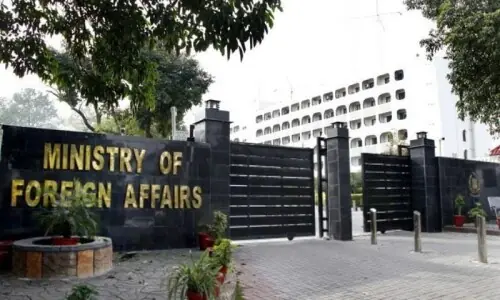In this age of electronic communications, letter-writing is fast becoming a dead art. But before the advent of the monster known as e-mail, letter-writing was a fine and gentle art with many master practitioners. In Urdu, Ghalib was one of them. In fact, with his letters Ghalib popularised the art of letter-writing to the point that it became a genre in Urdu. His letters, candid and written in plain Urdu, are a beautiful combination of personal and literary discourses.
Later, many wrote letters but perhaps none could surpass Ghalib. Still, letters of literary figures and learned personalities are of a great value, as they tell a lot about the writers` personality and their views, particularly if they are written in a frank manner. Apart from important biographical details and literary discussions, sometimes they give or lead to such information that is hard to come by. And if the letter-writer is a historian, journalist, scholar and researcher like Maulana Ghulam Rasool Mehr (1895-1971), the letters may be a virtual treasure-trove of rare knowledge and select literary and historical information.
Ghulam Rasool Mehr was, as I have mentioned in my piece on him (Dawn, October 7, 2008), a remarkable person by any standard. With his hugely extensive reading, encyclopaedic knowledge and a keen eye on history and classical literature, he could write almost anything well at will. He wrote, compiled, edited and translated over 100 books. His book on Syed Ismail Saheed and his companions, a result of his 20-year research, is considered among the most authentic ones on the subject and also his masterpiece. Some of his other books, too, `Ghalib`, `1857 ke mujahid` and `Tareekh-i-Sindh`, for instance, are ranked among his best, but his journalistic and political experiences, literary musings and scholarly remarks are preserved, though sporadically, in his letters.
Mehr`s prolificacy produced a large number of letters in addition to his books and articles as he was very prompt in replying to letters sent to him. Scholars from around the country wrote to him when confronted by a scholastic query and Mehr, armed with a photographic memory and a pen that knew how to hook the reader, would write, instantaneously and unassumingly, letters that would guide, encourage and enlighten them. He wrote some letters in quite an informal manner that are more of research papers than letters. Many well-known scholars, such as Qudrat Naqvi, Ayoob Qadri and Abu Salman Shahjahanpuri, wrote to Mehr inquiring about their favourite topics. Qudrat Naqvi Sahib usually asked about Ghalib. Ayoob Qadri Sahib`s queries were about the freedom war of 1857 and Abu Salman Sahib asked questions on Abul Kalam Azad. Mehr`s letters written to them in reply are no doubt a valuable storehouse of knowledge but they cover the specific topics. His fans also asked him questions on a variety of subjects and Mehr replied with due attention.
One such person, frequently writing to Mehr with a host of questions, was Muhammad Alam Mukhtar Haq. And the correspondence between the two was bizarre - they would meet personally and exchange letters. In fact, it began in 1960 with a letter from Haq Sahib asking about some historical personalities and the sources from where he could learn a few things on the topic. Mehr`s kindness and courtesy shown by a prompt and detailed reply despite his immensely busy schedule mesmerised Haq and thus began a relationship that was to last till Mehr`s death on November 16, 1971. After the initial correspondence, Mehr Sahib invited Haq to prepare a list of the books housed in Mehr`s library. Haq Sahib began preparing the list gladly but then complained that it had deprived him of the pleasure of writing and receiving letters. Mehr suggested that they could exchange letters in person. So, he would now bring a letter full of questions to Mehr and by the time he would leave his library after finishing the day`s work, the answers used to be ready. This is, probably, the only example in the literary world where `men of letters` traded letters in person.
Mehr`s letters in reply to Haq Sahib`s scholastic queries are indeed a great treasure. These letters created a great excitement when they were first published in Lahore`s monthly `Ar-Rasheed` from March 1992 to March 2000. What increased their usefulness were the annotations written by Muhammad Alam Mukhtar Haq. Still some more notes were added to the letters by Abdur Rasheed Arshad, the editor of the magazine, thereby making them even more useful. After reading these letters in the magazine, Mushfiq Khwaja wrote to Mukhtar Haq “These letters are a treasure of knowledge. Mehr`s letters are truly scholarly ones. Hardly a line is in them that does not add to the knowledge of the reader.”
Thoughtfully titled `Ganjeena-i-Mehr`, or Mehr`s treasure, these letters with annotations have now been published in two volumes by the Maghribi Pakistan Urdu Academy of Lahore (it reminds me of Dr Waheed Qureshi, the director of the academy who has relentlessly been publishing research works despite his not-so-good health. His determination and hard work must excite the envy of some of young scholars).
It is really difficult, almost impossible, to sum up the matter of these two volumes as the letters are on a variety of subjects Persian poetry, Urdu literature, lexicography, Islamic history, history of India-Pakistan, Iqbal`s date of birth, Maulan Muhammad Ali Jauhar`s humorous poetry, dictionaries, historical personalities ... and what not. A large number of these letters discuss or inform the reader about books, especially reference books or rare ones.
The only thing that these two volumes lack is an index. A detailed index would have greatly enhanced the already high value of the book and none other than the compiler, Muhammad Alam Mukhtar Haq, would have carried out the task easily as he is not only a veteran in the field and has compiled and annotated many books but he also owns a huge library containing rare and reference books.
— drraufparekh@yahoo.com






























